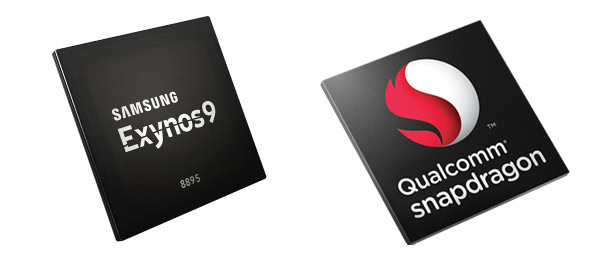Affiliate links on Android Authority may earn us a commission. Learn more.
Regulator: Qualcomm stopped Samsung from selling Exynos chips to other companies (Updated)

Update, March 27, 12:53: Qualcomm reached out to us with the following statement:
“Qualcomm has never stood in the way of Samsung selling chips to third parties, and nothing in our agreements has ever prevented Samsung from doing so. Any statement to the contrary is false.”
This is a strong rebuttal of the report out of Korea and the KFTC’s accusation. That said, Qualcomm has also vigorously opposed previous allegations of wrongdoing in its licensing business, allegations that brought it two massive fines in China and South Korea.
Original post, March 27, 10:12AM: A decades-old licensing agreement prevented Samsung from selling its Exynos chips to other phone makers.
According to the Fair Trade Commission of South Korea (KFTC), cited by The Korea Economic Daily, Qualcomm and Samsung signed a licensing deal for Qualcomm’s CDMA telecommunication technology back in 1993. The deal gave Samsung the right to manufacture CDMA modems for its own mobile devices, but prohibited it to sell CDMA modems to other companies.
Exynos in the spotlight
Two decades later, technology advancements allowed Samsung to incorporate a CDMA-compatible modem in its Exynos line of SoCs. Samsung’s first SoC to feature an integrated LTE modem was announced in 2014 and marketed as ModAP, a contraction of “modem” and “application processor.” The problem? The first ModAP and the following Exynos chips fell under the limitations of the 1993 licensing agreement, meaning that Samsung could only use them for its own phones.
The Korea Economic Daily reports that Samsung tried to renegotiate the 1993 deal with Qualcomm, starting in 2011. It’s not very clear from the source what happened, but Samsung apparently agreed to compensate Qualcomm in the eventuality that third-party manufacturers that used Exynos chips would refuse to pay Qualcomm its CDMA licensing fees. Negotiations reportedly broke down in 2014 after Qualcomm changed its terms for the new agreement.
According to the KFTC, the 1993 licensing agreement was unlawful, because it restricted the use of chipsets manufactured by Samsung. As part of its recent decision to fine Qualcomm almost $900 million, the regulator also demanded that Qualcomm would renegotiate its deals with Samsung to allow the sale of Exynos chips to other parties.
What about Meizu?
Seemingly refuting this report is the fact that at least one phone maker does use Exynos processors in its devices. Chinese manufacturer Meizu released several phones that feature Samsung-made processors, most recently with the Meizu Pro 6 Plus, which is powered by the Exynos 8890 SoC.
That said, Samsung has no qualms making its other components, including memory chips and displays, widely available, so we have to wonder why the Korean giant only sells its mobile SoCs to one small company in China. It’s possible that Samsung somehow worked around Qualcomm’s restrictions when it comes to Meizu or there’s some other unknown factor at play.
In a possibly related move, Qualcomm sued Meizu in June 2016.
“Meizu is choosing to use [Qualcomm’s] technologies without a license, which is not only unlawful, but is unfair to other licensees that are acting in good faith and respectful of patent rights, and ultimately damaging to the mobile ecosystem and consumers,” said Don Rosenberg, executive vice president and general counsel of Qualcomm.
On December 30, 2016, Qualcomm and Meizu announced an agreement to settle all their licensing disputes.
Wrap up
We will likely never truly understand the complex web of highly-confidential deals that governs the mobile industry. Qualcomm’s contributions to the development of the mobile industry cannot be overstated, but its utter dominance has arguably hurt the ecosystem. And that dominance relies heavily on aggressively-enforced patent deals.
We’ve reached out to Qualcomm and Samsung and we’ll update this post if we hear back.